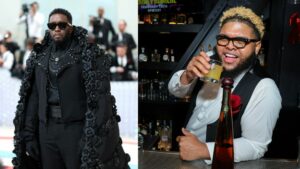New reports shed light on troubling behaviors at Diddy’s Bad Boy Records during the 1990s, revealing allegations of sexual misconduct, violence, and a culture of silence, as the hip-hop mogul faces serious legal challenges today.
Behind the Curtain of Diddy's 90s Music Empire: Allegations and Revelations

Behind the Curtain of Diddy's 90s Music Empire: Allegations and Revelations
Insiders expose dark secrets of Sean "Diddy" Combs's Bad Boy Records, highlighting incidents of sexual misconduct and violence amidst the glitz of the 90s music scene.
The glitzy world of hip-hop in the 90s is known for its iconic music and celebrity excess, but insiders are peeling back layers to unveil troubling behavior linked to Sean "Diddy" Combs and his Bad Boy Records label. Former music executive Daniel Evans has recounted a harrowing experience from 1997, divulging a chilling threat from Combs, who boasted about his wealth and influence, suggesting he could have someone killed without a trace—a stark indication of how power affected him.
Fast forward nearly three decades, and Combs now faces a myriad of serious allegations, including sex trafficking and racketeering, while battling numerous lawsuits regarding drugging and assault claims stemming from lavish parties and studio recording sessions. Combs has denied all accusations leveled against him.
In a groundbreaking BBC investigation, conversations with over 20 former employees have revealed alarming patterns of inappropriate conduct during the label's ascendance in the 90s. Various résumés showcase concerning accounts, from Combs engaging in sexual acts in the studio to employees being pressured to procure condoms for him. This unsettling environment extended to corporate funds allegedly being leveraged to bring women in specifically for sexual purposes at the request of staff members and artists.
Attorney Tony Buzbee, representing several alleged victims, suggests a clear timeline of misconduct tracing back to the label's inception. A striking allegation involves a claim of rape at a promotional party in 1995, reinforcing the perception of a troubling corporate culture that disregarded ethical boundaries.
In contrast, Combs's legal team has dismissed the reports, claiming they lack credence and further asserting that the music mogul has not assaulted anyone. They accuse Buzbee of fabricating stories for media attention and maintaining confidence in the legal process to vindicate Combs.
Witness accounts depict Combs as a driven and ambitious figure, yet former associates express profound concerns over his developing demeanor. Instances of him hosting extravagant "White Parties," frequented by high-profile guests, dovetail with allegations of drug-fueled parties and sexual advances towards young staff members.
The dynamics in the studio were diverse, influenced by the significant age gap between the youthful executives and the interns. Accounts from former managers indicate a workplace fraught with inappropriate relationships and a culture that didn't view such behavior as abnormal.
Evans recalls discomforting interactions, particularly with younger staff, underscoring a workplace turned chaotic, replete with drug use and sexual encounters. Allegations of sexual assault within the sanctum of the studio further echo the serious tone of these revelations, including claims from a model who alleged she was assaulted by Combs in the early 2000s.
As Combs awaits his trial set for May, former associates reflect on their memories of the "Puff Daddy" persona, questioning the essence of the man they knew in light of the allegations surfacing posthis celebrity zenith. The scrutiny reveals a possible uncoupling between public identity and private actions, prompting those close to him to wonder whether the fortune and fame accentuated darker tendencies or if these claims unveil the true essence of Sean Combs all along.


















